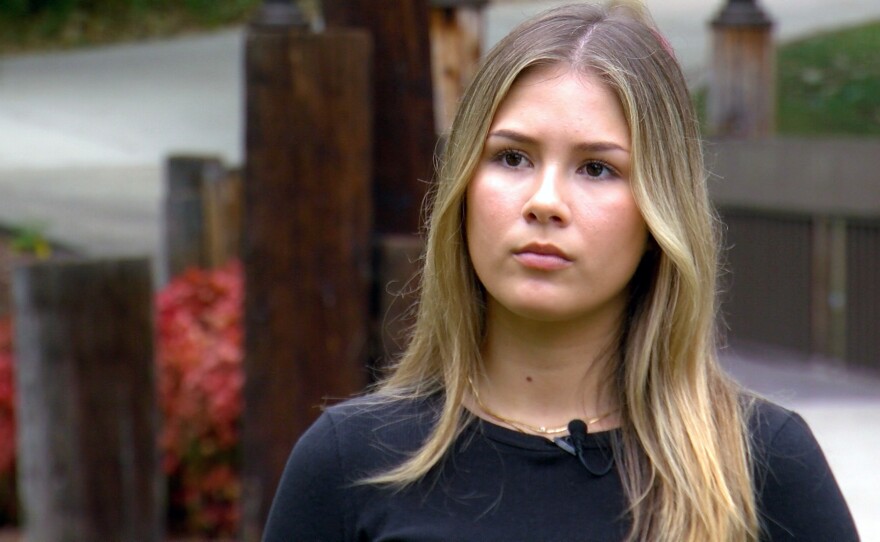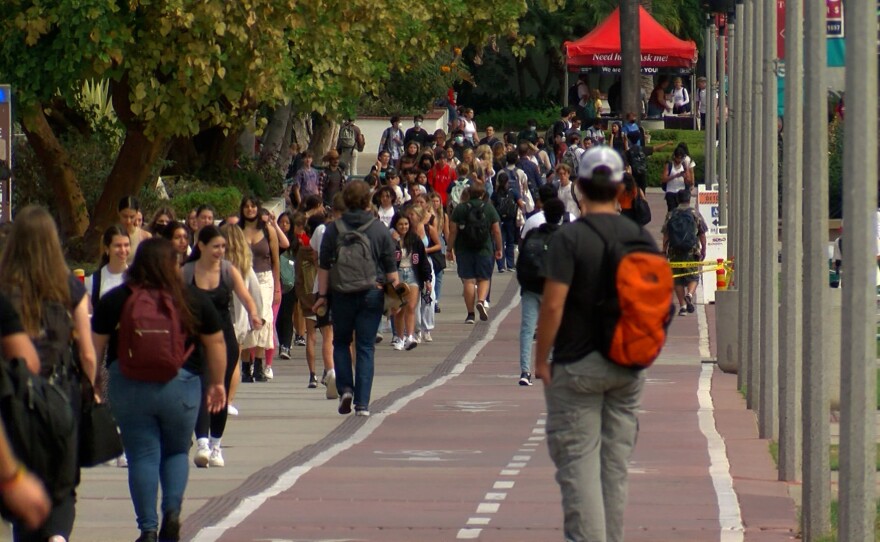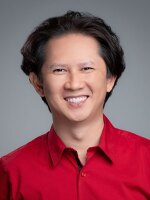Editor's Note: The following story includes a description of a sexual assault, which some readers may find disturbing.
It’s been just over a year since a teenager reported she was gang-raped allegedly by San Diego State University football players at a Halloween party off campus.
Since then, very little has happened with the case. No criminal charges have been filed, and SDSU says its own investigation is still ongoing. Meanwhile, a team of outside auditors is examining how the university's Title IX office conducts investigations into sexual harassment and violence.
It's part of a systemwide audit ordered by the California State University (CSU) system after several high-profile cases revealed a disparity in responses at several campuses.
Not feeling supported

SDSU student Jordan Rosenquist says she experienced that disparity firsthand in September 2021. "I was sexually assaulted in a SDSU dorm hall," she said.
Rosenquist's alleged attacker lived in the same building as her, in a dorm right above hers.
She reported the assault within two hours to the university’s Title IX office, which is in charge of investigating allegations of sexual violence on campus. But instead of being helped, she says she felt pushback.
“I did not feel supported by the SDSU Title IX office at all," Rosenquist said. "I felt like I was more working against them than they were working with me."
Resources at SDSU for sexual assault victims
• SDSU Counseling & Psychological Services: (619) 594-5220 (non-emergency)
• Counseling Access & Crisis Line: (888) 724-7240, www.sa.sdsu.edu/cps/
• Student Health Services, Calpulli Center: (619) 594-5281, shs.sdsu.edu/index.asp
• SDSU Police Department: (619) 594-1991
• Center for Community Solutions: (888) 385-4657 (bilingual rape crisis hotline), ccssd.org
She said the university did not immediately inform her of her rights as a sexual assault victim. She had to hire a lawyer for that.
That is not what's supposed to happen under Title IX, said attorney Jenna Rangel.
“When the school receives any report of sexual harassment or assault, they do have a duty to promptly respond and provide information about what their grievance process is, their investigative process and then what supportive measures they might have available,” Rangel said.
Rangel is currently representing members of the women’s rowing team, who are suing SDSU for Title IX violation related to sports, but is not a party to this case.
Title IX is a section of U.S. education law enacted in 1972 that prohibits federally funded educational institutions from discriminating against students or employees based on sex.
In a statement, then-acting CSU Chancellor Steve Relyea described the audit as a comprehensive look at how the 23 campuses in the system are complying with the law.
"The CSU is initiating a Title IX assessment across the nation's largest public four-year higher education system to ensure the health, safety and welfare of our students, faculty and staff," Relyea said in a statement.
The audit started at Fresno State University and auditors will be on the SDSU campus in November. A SDSU spokesperson said in an emailed statement to KPBS that the university cannot comment on specific cases and would not speak to the audit except to say it is coming.
Rangel expects auditors to examine how SDSU's Title IX office processes complaints like the one from Rosenquist.
“I think they are going to be looking at all instances in which complaints were made, how those complaints were made," she said. "Meaning do they have effective policies and procedures in place and notices in place to where the people who complained were able to find that information easily.”
Inaction leaves survivors vulnerable

Rosenquist said the university needs to do a much better job of making victims feel protected. She feels the office did nothing to protect her against her alleged attacker even after she got a restraining order against him.
“I felt so much anxiety every single day when I was on campus because I even brought the restraining order to the San Diego State Police Department and officials on campus," Rosenquist said. "I gave a copy to Title IX, and he actually violated that restraining order, and I reported it, and they did nothing about it.”
A spokesperson for SDSU's police department told KPBS it cannot comment on specific cases but said that once the department receives a report of a restraining order violation, detectives "will initiate an investigation by reviewing the terms of the restraining order and collecting statements and evidence."
Rosenquist said SDSU’s Title IX office told her they waited to investigate her allegation because it’s the school policy to wait until after the police investigation is over.
SDSU said there is no such policy and that the Title IX office would not have relayed that information to Rosenquist.
"Once a complaint is filed, a Title IX investigator is assigned to the case and immediately connected with the student who filed the complaint,” the university said in an email statement to KPBS.
Yet, SDSU said essentially the same thing when it was asked why it delayed its investigation into the rape allegation against three football players at a Halloween party off campus last year.
The incident happened roughly a month after Rosenquist’s assault.
“That hit a cord with me because I really felt for that person because although our incidents were not the same, I knew what they were going through,” she said.
Rangel said there is no reason why both can’t happen at the same time, adding that the university has a duty to protect students who could be in danger from the alleged attackers.
"So just saying, well, we can't do anything about it because the police is involved, seems like an easy out,” Rangel said.
But she acknowledges there is no specific guidance under Title IX on whether schools can start their own investigations while the police are doing theirs but that deference to police should be done on a case-by-case basis.
"(In this case), the only justification for them not investigating is that one fact alone — that the police was involved,” Rangel said.
Not SDSU's first Title IX audit

This is not the first Title IX audit at SDSU. In 2014, an audit found that SDSU faculty and staff were not sufficiently trained in responding to and reporting sexual assaults and harassment.
The report also faulted SDSU for not requiring students to undergo yearly sexual assault and harassment prevention training. The report also recommended that the university establish a confidential advocate for students who were sexually assaulted or harassed.
Since then, the university has mandated the training for all students and staff. Also, in 2015, SDSU received a state grant to fund a full-time sexual assault victim advocate on campus. The university contracted with the Center for Community Solutions (CCS) to provide the advocate.
The advocate is independent from the university, which a good thing for sexual assault survivors, said Christy Heiskala, a sexual assault victim advocate who is a neutral party.
“They are a confidential person that the survivor can talk to and know that everything's going to be held confidentially,” Heiskala said.
Disparity in responses from different campuses

While the CSU now requires all campuses to have a sexual assault victim’s advocate, their workloads vary by campus.
At CSU San Marcos, for example, there are two advocates for a student body of 14,000. Likewise, CSU Fullerton, with 17,000 students, is in the process of getting a second full-time advocate. San Diego State, however, only has one full-time advocate for 30,000 students.
Heiskala said there is a shortage of qualified advocates.
"It's a high turnover. I feel like the advocates don't have enough experience going into it, especially campus experience," she said. "They may have all the training they need, but they need more hands-on experience working with survivors from campus sexual assault.”
Rosenquist hopes the Title IX audit will make some much-needed changes to the Title IX office at SDSU.
“They really need to push for protecting their students and protecting their survivors that have gone through this rather than just kind of being passive in the process."
This month, Rosenquist got some closure on her case. Her alleged attacker was found to have violated school policy on sexual assault.
But it was a hollow victory. She wanted him to be expelled, but he already dropped out.
“When you take no action and these students are allowed to leave school without any consequence, how does that deter people from doing it in the future?” Rangel said.
KPBS is a broadcast service of San Diego State University















